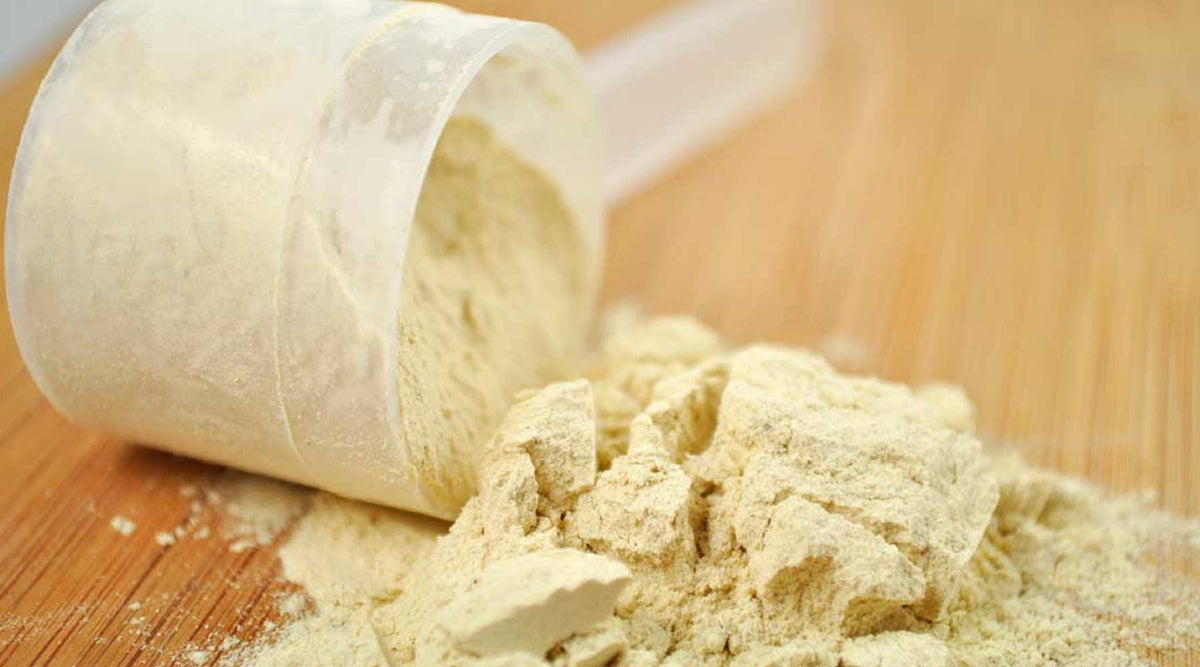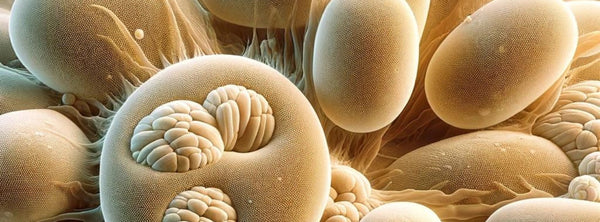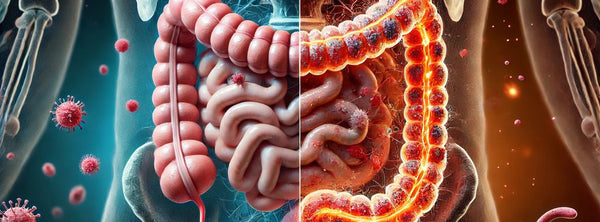
Human and animal scientific studies have shown many potential health benefits of whey protein such as the ones listed below;
Human studies have found the following Health Benefits Whey Protein;
- Reduce muscular atrophy (muscle loss) also known as sarcopenia that occurs as a consequence of the ageing process (1).
- Improve athletic performance, endurance and stamina (2).
- Facilitate muscle growth by increasing the body's retention of nitrogen. Nitrogen retention from whey protein is believed to be sixteen times that of free amino acids and twice that of whole food (3).
- Increase muscle strength and growth (3).
- Enhance the function of satellite cells, which are involved in the repair, and regeneration of muscles (4).
- Reduce weight in persons afflicted with obesity by stimulating the production and release of cholecystokinin (CCK) and glucagon-like peptide 1 (both of which reduce appetite by increasing a sense of fullness), and by inhibiting ghrelin which stimulates digestion (5,8).
- Help to prevent and treat osteoporosis (by activating osteoblasts which are cells responsible for bone growth and repair) (6,7).
- Reduce appetite by stimulating the production and release of cholecystokinin (CCK) and glucagon-like peptide 1 (both of which reduce appetite by increasing a sense of fullness), and by inhibiting ghrelin which stimulates digestion (8).
- Be useful for children with autism (due to its ability to increase glutathione levels which reduces oxidative stress in the brain) (9).
- Counteract some of the negative effects associated with excessive stress (specifically the tryptophan content of the alpha-lactalbumin component of whey protein may increase the brain's serotonin levels – excessive stress often causes serotonin depletion and this depletion of serotonin is one of the causes of the cognitive impairment experienced during stress) (10).
- Inhibit the constriction of the bronchial tract in (exercise-induced) asthma patients (11).
- Reduce the severity of psoriasis (possibly due to the transforming growth factor-beta2 content of whey protein) (12).
- Improve liver function in (chronic) hepatitis B patients (13).
- Counteract the suppression of the immune system that occurs in people who engage in excessive exercise (14).
- Be a valuable treatment for acquired immune deficiency syndrome (AIDS) – it significantly improves the function of the immune system in AIDS patients (15,16).
- Lower blood pressure in hypertension patients (due to the alpha-lactalbumin and beta-lactoglobulin content of whey protein inhibiting angiotensin converting enzyme (ACE) (17-19).
- When correctly processed cause sustained increases in the body's glutathione levels (due to the high content of cysteine (a precursor of glutathione) in whey protein) (20-24).
Animal studies have found the following health benefits of Whey Protein;
- Possess life extension potential (it has caused a significant increase in longevity in mice studies) (25).
- Counteract the ability of excessive iron to cause cardiomyopathy (26).
- Help to prevent alcohol-induced gastric ulcers (27,28).
- Help to prevent cataracts (by supplying the lens with additional cysteine, the precursor of glutathione, itself the precursor for glutathione peroxidase) (29).
- At dosages of 30 grams per day, inhibit the growth of breast cancer cells and may cause the regression of some existing breast cancer tumours (30-33).
- Reduce the risk of colon cancer (34-36).
- Enhance the function of the immune system (37-39).
- Help to prevent cirrhosis of the liver (40).
- Be useful for the treatment of hemochromatosis (due to its ability to reduce the excessive generation of free radicals caused by the increased iron levels of hemochromatosis patients) (41).
- Help to prevent/treat insulin resistance (42,43).
- Reduce weight in persons afflicted with obesity by stimulating the production/release of cholecystokinin (CCK), the hormone responsible for satiety (i.e. reduced appetite) (42,43).
- Alleviate (atopic) eczema (44).
- Increase liver glycogen levels (45).
- Stimulate the endogenous production of insulin-like growth factor-1 (IGF-1) (46).
- When correctly processed cause sustained increases in the body's glutathione levels (due to the high content of cysteine (a precursor of glutathione) in whey protein) (47,48).
Important Notice: The studies represented above provide information to enhance knowledge and is not meant to be a diagnosis or treatment of any illness or ailment. We recommend that you contact your healthcare professional for further health advice.
References:
- Paddon-Jones, D., Et al. Differential stimulation of muscle protein synthesis in elderly humans following isocaloric ingestion of amino acids or whey protein. Exp Gerontol.2005.
- Lands, L C., et al. Effect of supplementation with a cysteine donor on muscular performance. Journal of Applied Physiology. 87(4):1381-1385, 1999.
- Burke, D. G., et al. The effect of whey protein supplementation with and without creatine monohydrate combined with resistance training on lean tissue mass and muscle strength. Int J Sport Nutr Exerc Metab. 11(3):349-364, 2001.
- Hulmi, J. J., et al. The effects of whey protein on myostatin and cell cycle-related gene expression responses to a single heavy resistance exercise bout in trained older men. Eur J Appl Physiol. 102(2):205-213, 2008.
- Frestedt, J. L., et al. A whey-protein supplement increases fat loss and spares lean muscle in obese subjects: a randomized human clinical study. Nutr Metab (Lond). 5(1):8, 2008.
- Itabashi, A., [Prevention of osteoporosis by foods and dietary supplements. Milk basic protein (MBP) increases bone mineral densityin young adult women and perimenopausal women.] Clin Calcium. 16(10):1632-1638, 2006.
- Hulmi, J. J., et al. The effects of whey protein on myostatin and cell cycle-related gene expression responses to a single heavy resistance exercise bout in trained older men. Eur J Appl Physiol. 102(2):205-213, 2008.
- Hall, W. L., et al. Casein and whey exert different effects on plasma amino acid profiles, gastrointestinal hormone secretion and appetite. British Journal of Nutrition. 89(2):239-248, 2003.
- Kern, J. K., et al. Oral tolerability of cysteine-rich whey protein isolate in autism – a pilot study. Journal of the American Nutraceutical Association. 11(1):36-41, 2008.
- Markus, C. R., et al. Whey protein rich in alpha-lactalbumin increases the ratio of plasma tryptophan to the sum of the other large neutral amino acids and improves cognitive performance in stress-vulnerable subjects. American Journal of Clinical Nutrition. 75(6):1051-1056, 2002.
- Baumann, J. M., et al. Effects of cysteine donor supplementation on exercise-induced bronchoconstriction. Med Sci Sports Exerc. 37(9):1468-1473, 2005.
- Drouin, R., et al. XP-828L (Dermylex), a new whey protein extract with potential benefit for mild to moderate psoriasis. Can J Physiol Pharmacol. 85(9):943-951, 2007.
- Watanabe, A., et al. Nutritional therapy of chronic hepatitis by whey protein (non-heated). J Med. 31(5-6):283-302, 2000.
- Ha, E., et al. Functional properties of whey, whey components, and essential amino acids: mechanisms underlying health benefits for active people (review). J Nutr Biochem. 14(5):251-258, 2003.
- Micke, P., et al. Oral supplementation with whey proteins increases plasma glutathione levels of HIV-infected patients. Eur J Clin Invest. 31(2):171-178, 2001.
- Moreno, Y. F., et al. Features of whey protein concentrate supplementation in children with rapidly progressive HIV infection. J Trop Pediatr. 2005.
- Pal, S., et al. The chronic effects of whey proteins on blood pressure, vascular function, and inflammatory markers in overweight individuals. Obesity. 2009.
- Pins, J. J., et al. The antihypertensive effects of a hydrolyzed whey protein isolate supplement. Cardiovascular Drugs and Therapy. 16(Supplement 1):68, 2002.
- Pins, J. J., et al. Effects of whey peptides on cardiovascular disease risk factors. J Clin Hypertens (Greenwich). 8(11):775-782, 2006.
- Lands, L. C., et al. Lymphocyte glutathione levels in children with cystic fibrosis. Chest. 116:201-205, 1999.
- Micke, P., et al. Oral supplementation with whey proteins increases plasma glutathione levels of HIV-infected patients. Eur J Clin Invest. 31(2):171-178, 2001.
- Middleton, N., et al. Whole blood and mononuclear cell glutathione response to dietary whey protein supplementation in sedentary and trained male human subjects. Int J Food Sci Nutr. 55(2):131-141, 2004.
- Moreno, Y. F., et al. Features of whey protein concentrate supplementation in children with rapidly progressive HIV infection. J Trop Pediatr. 2005.
- Zavorsky, G. S., et al. An open-label dose-response study of lymphocyte glutathione levels in healthy men and women receiving pressurized whey protein isolate supplements. Int J Food Sci Nutr. 58(6):429-436, 2007.
- Bounous, G., et al. The influence of dietary whey protein on tissue glutathione and the diseases of aging. Clin Invest Med. 12(6):343-349, 1989.
- Bartfay, W. J., et al. Milk whey protein decreases oxygen free radical production in a murine model of chronic iron-overload cardiomyopathy. Can J Cardiol. 19(10):1163-1168, 2003.
- Castro, G. A., et al. Anti-ulcerogenic effect of a whey protein isolate and collagen hydrolysates against ethanol ulcerative lesions on oral administration to rats. J Med Food. 13(1):83-90, 2010.
- Rosaneli, C. F., et al. Efficacy of a whey protein concentrate on the inhibition of stomach ulcerative lesions caused by ethanol ingestion. J Med Food. 5(4):221-228, 2002.
- Spector, A., et al. The prevention of cataract caused by oxidative stress in cultured rat lenses. I. H2O2 and photochemically induced cataract. Curr Eye Res. 12(2):163-179, 1993.
- Eason, R. R., et al. Dietary exposure to whey proteins alters rat mammary gland proliferation, apoptosis, and gene expression during postnatal development. Journal of Nutrition. 134(12):3370-3377, 2004.
- Hakkak, R., et al. Diets containing whey proteins or soy protein isolate protect against 7,12-dimethylbenz(a)anthracene-induced mammary tumors in female rats. Cancer Epidemiol Biomarkers Prev. 9(1):113-117, 2000.
- Kennedy, R. S., et al. The use of a whey protein concentrate in the treatment of patients with metastatic carcinoma: a phase I-II clinical study. Anticancer Research. 15(6B):2643-2649, 1995.
- Rowlands, J. C., et al. Soy and whey proteins downregulate DMBA-induced liver and mammary gland CYP1 expression in female rats. Journal of Nutrition. 131(12):3281-3287, 2001.
- Bounous, G., et al. Dietary whey protein inhibits the development of dimethylhydrazine induced malignancy. Clin Invest Med. 11(3):213-217, 1988.
- Hakkak, R., et al. Dietary whey protein protects against azoxymethane-induced colon tumors in male rats. Cancer Epidemiol Biomarkers Prev. 10(5):555-558, 2001.
- Xiao, R., et al. Dietary exposure to soy or whey proteins alters colonic global gene expression profiles during rat colon tumorigenesis. Mol Cancer. 4(1):1, 2005.
- Bounous, G., et al. Differential effect of dietary protein type on the B-Cell and T-Cell immune response in mice. Journal of Nutrition. 115(11):1403-1408, 1985.
- Bounous, G., et al. Immunoenhancing property of dietary whey protein in mice: role of glutathione. Clin Invest Med. 12(3):154-161, 1989.
- Wong, C. W., et al. Immunomodulatory effects of dietary whey proteins in mice. J Dairy Res. 62(2):359-368, 1995.
- Kume, H., et al. Hepatoprotective effects of whey protein on d-galactosamine-induced hepatitis and liver fibrosis in rats. Biosci Biotechnol Biochem. 70(5):1281-1285, 2006.
- Bartfay, W. J., et al. Milk whey protein decreases oxygen free radical production in a murine model of chronic iron-overload cardiomyopathy. Can J Cardiol. 19(10):1163-1168, 2003.
- Belobrajdic, D., et al. The effects of dietary protein on rat growth, body composition and insulin sensitivity. Asia Pac J Clin Nutr. 12(Supplement):S42, 2003.
- Belobrajdic, D. P., et al. A high-whey-protein diet reduces body weight gain and alters insulin sensitivity relative to red meat in Wistar rats. Journal of Nutrition. 134(6):1454-1458, 2004.
- Shimizu, N., et al. Dietary whey protein hydrolysate suppresses development of atopic dermatitis-like skin lesions induced by mite antigen in NC/Nga mice. Allergol Int. 55(2):185-189, 2006.
- Morifuji, M., et al. Dietary whey protein modulates liver glycogen level and glycoregulatory enzyme activities in exercise-trained rats. Exp Biol Med (Maywood). 230(1):23-30, 2005.
- Zaloga, G. A. R., et al. Effect of enteral diets on whole body and gut growth in unstressed rats. J PEN. 15(1):42-47, 1991.
- Bounous, G., et al. The influence of dietary whey protein on tissue glutathione and the diseases of aging. Clin Invest Med. 12(6):343-349, 1989.
- Bounous, G., et al. The biological activity of undenatured dietary whey proteins: role of glutathione. Clin Invest Med. 14(4):296-309, 1991.



